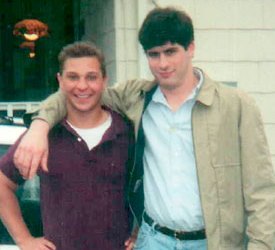Last month, a story about me and my friend Fraser appeared on the Rutgers Today website. It is currently featured on the front page of the Rutgers New Brunswick website.
Fraser and I met at Voorhees High School in the the winter of the 1991-92 school year. We were in honors sophomore English. There were a number of difficult kids in that class, and I still feel a bit badly for our teacher, Peggy Quadrini. Fraser and I spent the next couple of years partying, joking, eating, slacking off, watching sports, arguing and generally getting involved in chaos and mayhem. Eventually, I changed my behavior, joined the Army and went to college. Fraser spiraled downward. He cycled in and out of jails and recovery, bouncing from job to job and house to house. It was a nomadic life. A couple of times a year, he would put 60 to 120 days of continuous sobriety together. Each time he relapsed, I felt despair and anger. My first thought would be, “How could he do this to me?” and my second thought would be, “Why can’t he get it?”
In 2001, Tuffer and I picked him up from the Green Street Jail in Newark. They made us wait 4 hours until he had been there for 12 hours, so that they could bill someone for a full day in jail. After 9/11, Fraser talked his way onto the site at Ground Zero and helped in the rescue and rubble clearing efforts. In 2002, I visited him at the Somerset County Jail. His father had just passed away, and he told me, “The last time I saw my Dad was through the thick, plate-glass window of the visiting room here in jail.” The last time I saw him was on July 8, 2002 in Clinton, NJ. He was boarding a van to go back to Freedom House (a halfway house that I really like in Glen Gardner, NJ). Eventually, he left it against medical advice. On September 23, I received a phone call from our friend Nat that Fraser had died the night before. We pieced together that he had been drinking and doing drugs. He threw up and choked on his own vomit and died. We suspect that the person he was dating was there at the time and didn’t call emergency services for several hours (because she was high at the time and there wasn’t a Good Samaritan Act then). I cried for days and felt empty. I kept thinking “I could have done more” or “I should have been there.”
Several people pointed out that I couldn’t have prevented his death and that I was powerless over his addiction. I grieved for a long time. Eventually, I realized that I was also angry at him for dying. It was hard being angry at my dead friend. I talked about it with a lot of people. A few months after his funeral, I left for Toyko, Japan. I taught English there for a year and then traveled around Japan and Southeast Asia. I mourned for Fraser and thought about what I was going to do with my life. When I returned to America, I took at job at Integrity House in Secaucus, NJ. A month after I started that job, I also applied to the MSW program at Rutgers.
I have been working in the field of substance abuse for 11 years now. The following is the best advice that I can give people that are concerned about a friend, family member or loved one that you think has an alcohol and/or drug problem:
(1) Don’t drink or do drugs with them
(2) Don’t drink or do drugs around them
(3) Set firm boundaries – don’t let them drink or do drugs around you.
(4) Don’t give them money. For anything. Money you give them for food, rent, clothes, legal fees or something else is very likely to be used for alcohol or drugs
(5) Get into therapy. You need someone to talk to about this. If you are a student in middle school, high school or college, there should be a counselor available at there for you to talk to
(6) Attend Al-Anon or Alateen. At least 6 times. If you go to a meeting and the focus is on the alcoholic or addict, go find a different meeting where the people there talk about themselves, their feelings and their actions (or inaction)
(7) Work with a professional and consider imposing consequences: taking away the car, their phone, kicking them out or even calling law enforcement on them. Encourage (or force) them to go see a licensed professional
(8) Confront them. Express your concerns. Do not yell, curse or name-call. Explain how you see they have changed, how you feel and what you want to be different (a professional can really help you with this). This is extremely important, as one of the criteria that professionals look for is, “Has someone every confronted you about your drinking or drug use?” If multiple people have confronted someone, that can help them get clean years before they might otherwise.
There are other things you can do, but this is a great start. Stop and think about how much time and energy you have spent worrying about your loved one. Do you get distracted during the middle of your day or lie in bed thinking about her late at night? Have you neglected other areas (or people) in your life? Have you made excuses or blamed others (their friends, the school, co-workers, ex’s or cops) for his behavior? If you’ve answered yes to any of those three questions, then you should go see a professional and follow my aforementioned steps. You may or may not be able to help your loved one, but you’ll certainly be able to help yourself.

2 thoughts on “What to do when your friend or family member has a drug problem”
Comments are closed.